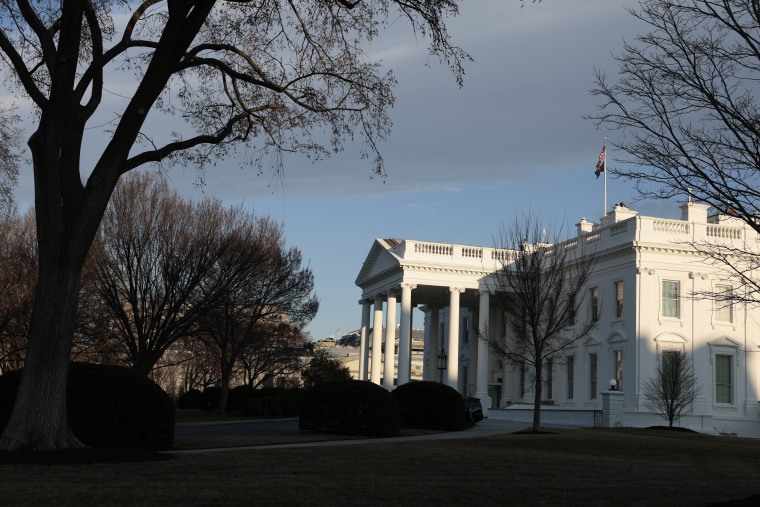During yesterday’s Jan. 6 committee hearing, Mick Mulvaney briefly marveled at the kind of folks Donald Trump listened to after his 2020 election defeat. Pointing to the assorted cranks and charlatans who ultimately became the outgoing president’s inner circle, the former White House chief of staff wrote on Twitter, “Garbage in. Garbage out.”
This is a fairly common argument among those looking to offer Trump some kind of support. The former president’s efforts to overturn the election, undermine American democracy, and peddle the lies that fueled insurrectionist violence weren’t entirely his fault, the argument goes. Rather, the blame should go to the radicals who pushed the Republican in dangerous directions.
If only there’d been “adults in the room,” these voices tell us, Trump might’ve chosen a more responsible course.
Perhaps Mulvaney missed the point of yesterday’s hearing — because if the testimony told us anything, it’s that there were adults in the room. The then-president simply didn’t like what they had to say, so he ignored and replaced them. NBC News reported:
On Election Night 2020, Donald Trump was bombarded by top aides telling him that he had lost and that his claims about voter fraud were “completely nuts,” according to their own testimony played Monday by the House Jan. 6 committee. Instead of listening to White House and campaign aides, the advisers said the former president sided with a “definitely intoxicated” Rudy Giuliani to launch a movement that culminated in the Jan. 6 attack on the U.S. Capitol.
Yes, the cranks and charlatans eventually worked their way into the Oval Office, but over the course of two hours yesterday, the public heard testimony from top members of Trump’s team who agreed that (a) he lost the election; (b) claims of systemic fraud were “completely bogus”; and (c) there was no legitimate, legal recourse that would’ve kept the Republican in office.
Trump was provided with the truth before Election Day 2020, when his team told him he was on track to lose. They provided him with the truth on election night, when his team told him he could not credibly claim victory. They provided him with the truth in the days that followed the election, when his team repeatedly assured the Republican that he had, in fact, lost.
The problem was not that the president was stuck in a bubble, unaware of reality. Rather, the testimony highlighted the degree to which the then-president was overtly hostile toward reality: Trump intended to perpetrate a fraud, which necessarily meant ignoring those who presented him with facts that stood in the way of his wishes.
Bill Stepien, Trump’s campaign manager in 2020, said there was “Team Normal,” which he helped lead. Its members were sidelined when they told the truth.
Bill Barr helped explain why. Noting what would happen when he told Trump “how crazy some of these allegations were,” the former attorney general said, “There was never an indication of interest in what the actual facts were.”
If you took away nothing else from yesterday’s hearing, let it be those 13 words: “There was never an indication of interest in what the actual facts were.”
There’s a difference between ignorance and willful ignorance. There’s a difference between not knowing the truth and not wanting the truth.
At key moments, there were adults in the room. Trump’s campaign manager told him the truth. So did his attorney general. When Barr left, the acting attorney general presented the then-president with the facts, too. Trump’s campaign lawyer and campaign data analyst followed suit.
But this was a top-down operation, and adults’ boss told them that reality wasn’t good enough. Trump started with the lie — he’d secretly won the election that he’d lost — and expected his team to work backwards to bolster the bogus conclusion.
Barr shared a memorable story about an interaction with the then-president in which Trump struggled to contain his anger. It was shortly after Barr had told the Associated Press the truth about the absence of evidence of election fraud. The then-president said, “You must have said this because you hate Trump. You hate Trump.”
It was, of course, odd to hear about someone referring to themselves in the third person like this, but it was a peek into a perspective: Trump perceived facts as evidence of contempt. By this reasoning, if Barr liked Trump, the attorney general would’ve lied.
The larger point is not simply to reflect on a man who has earned a reputation as one of the most notorious liars in American history. As yesterday made clear, there may yet be legal and political consequences associated with a sitting president perpetrating a fraud based on information he knew to be false.

